Is this the end of the EV? As Tesla and BYD’s car sales plummet and Apple pulls the plug on its e-car project has the boom in electric vehicles finally short-circuited?
Tesla and Chinese rival BYD both reported a drop in sales, a further signal that the electric car industry is faltering – after Apple also recently pulled the plug on its own EV project.
The two companies, two of the biggest sellers of electric cars worldwide, have been forced to cut prices to boost demand for their cars as they battle stiffer competition, especially in China.
Nearly every model made by BYD has had its retail price slashed, accompanied by the slogan “electricity is cheaper than oil” – while a price war continues to rage in China, the world’s largest EV market.
There have been warnings from the traditional car industry for some time that the average buyer is being deterred from buying electric cars because they are more expensive than petrol alternatives and because of charging times and poor charging infrastructure.
It comes after carmakers from Mercedes-Benz to Ford announced they would delay or scrap further electric vehicles (EVs) as demand slowed in Britain and abroad.
Tesla has reported a drop in sales in a further signal that the electric car industry is faltering (Tesla cars pictured at a dealership in Austin, Texas in the US)
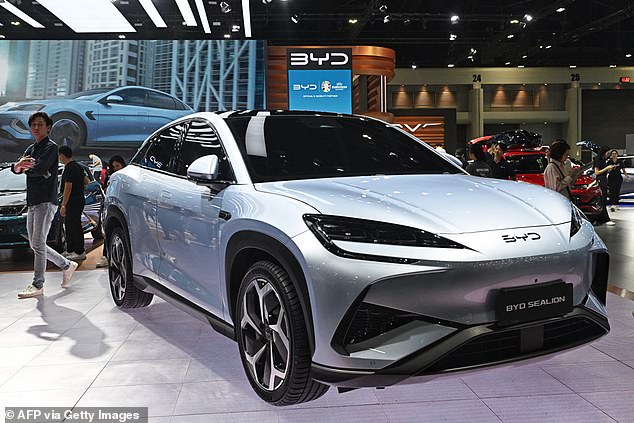
Chinese car company BYD saw a massive 42 percent drop in quarterly deliveries, selling 300,114 electric vehicles
In late February, Apple canceled work on its electric car project called Titan and Aston Martin postponed the launch of its first battery electric vehicle (BEV) until 2026.
Mercedes-Benz has postponed its electrification goal, Ford said it was rethinking its EV strategies and Volkswagen has postponed the launch of an upcoming EV. And in recent months, Audi and General Motors have also overhauled their EV rollouts.
Purchases of new electric cars by private buyers fell by 25 percent in a year in January, according to figures from the Society of Motor Manufacturers and Traders (SMMT).
And forecasts showed BEVs will capture a 21 percent market share this year – down from a 22 percent estimate in October and the 23 percent expected a year ago.
High interest rates are one of the reasons behind a slowdown in demand for typically more expensive electric vehicles – which can be as much as £10,000 more expensive than their petrol or diesel equivalents – prompting the industry to cut jobs and reduce production.
In the first quarter of this year, from January to March, Tesla delivered just 386,810 cars, the lowest figure since quarter three of 2022 and a drop of more than a fifth from the end of last year.
This is also a decline of around eight percent from the same period last year and against expectations of around 450,000 car sales in the quarter, which the company was unable to achieve.
After Tesla announced the news yesterday, its shares fell by about five percent.
Despite the less-than-stellar news for Tesla and SpaceX founder Elon Musk, the US electric car maker has once again overtaken BYD as the world’s largest EV seller – as the Chinese company saw a massive 42 percent drop in quarterly deliveries.
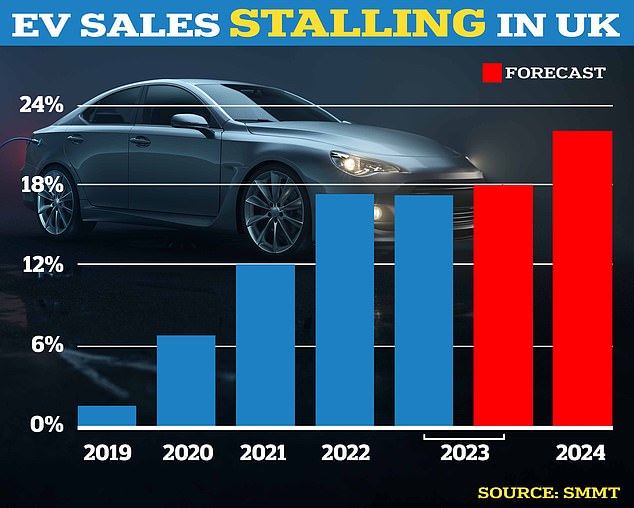
The share of EV sales fell from 16.6 percent in 2022 to 16.5 percent in 2023. It was forecast to reach 17.7 percent in 2023 (February data)
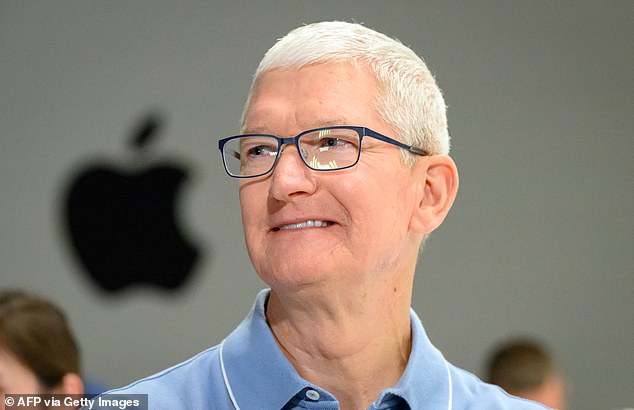
At the end of February, Apple (CEO Tim Cook in the photo) canceled work on its electric car project called Titan
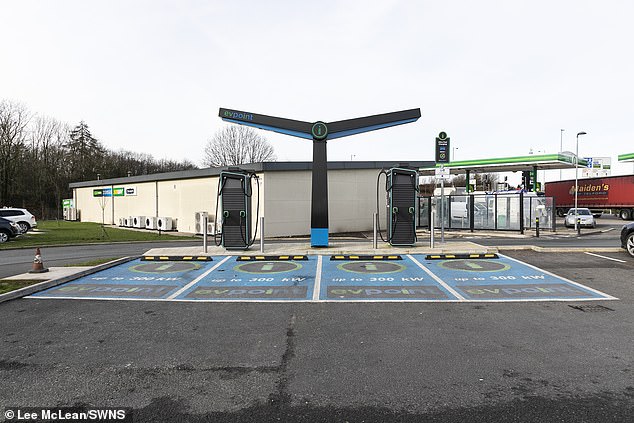
An empty electric vehicle charging station is pictured in Morley, Leeds, West Yorkshire
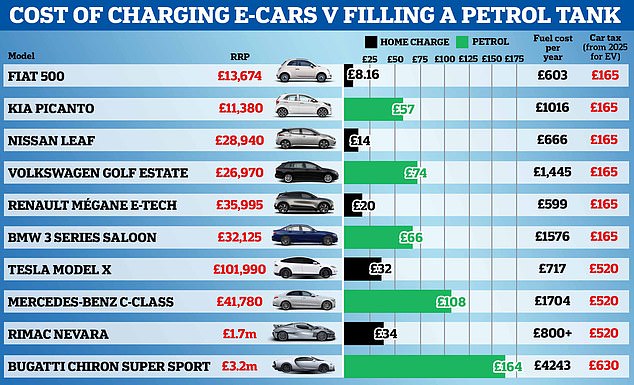
Electric car charging costs based on data from zap-map.com. The figures for petrol cars use the current price of unleaded fuel according to the RAC. The figures on fuel costs per year do not include any additional operating costs, such as maintenance
BYD, which sells both plug-in hybrids and fully electric cars, posted an update saying it sold 300,114 electric cars – after overtaking Tesla late last year. FT reports.
At the time, Tesla pointed the finger at factory shutdowns caused by disruptions in the Red Sea and an arson attack by eco-campaigners in Germany.
Figures also show that sales of new electric cars in Britain have slowed domestically.
A House of Lords committee report in February said sales of electric cars among private motorists are “at a standstill” because many cannot afford them and because of the slow rollout of public chargers – especially in rural areas.
But MailOnline found that even where public chargers were installed, many EV charging stations remained empty.
The poor sales have sparked a backlash at Westminster, with actor and comedian Rowan Atkinson even being blamed after he described EVs as ‘a bit soulless’ in a commentary piece he wrote in June last year.
It fits in with a government target to completely phase out petrol, diesel and hybrid vehicles by 2035 – something Prime Minister Rishi Sunak postponed for five years in September.
Industry figures show that sales of new electric cars to private car buyers fell by 25 percent last month compared to January 2023.
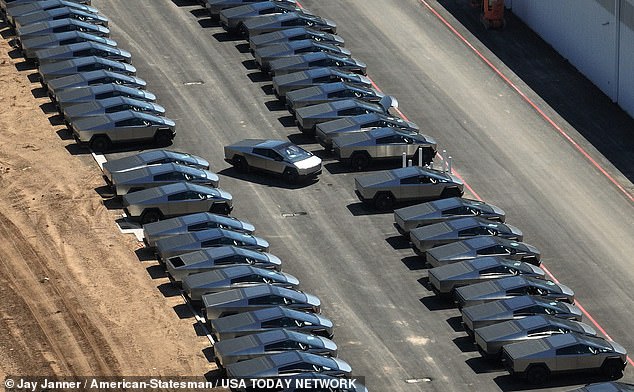
Controversial Tesla Cybertrucks are lined up at the company’s ‘Gigafactory’ in Texas
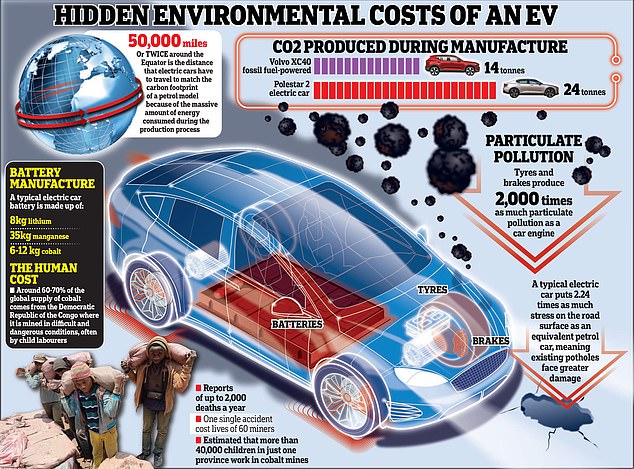
Image revealing some of the hidden environmental costs of electric cars
And annual figures showed that the share of car sales that were electric had fallen from 16.6 percent in 2022 to 16.5 percent last year – the first time the reverse has happened.
The Office for Budget Responsibility (OBR) had forecast that electric vehicles would account for 17.7 percent of new car sales by March 2023. They also predicted that sales would increase to 59.6 percent by 2026-2027.
The OBR believes customers are being put off by the higher upfront costs, while the availability of public charging points also appears to be a concern for many motorists.
Although sales of electric cars among companies have grown by 42 percent, this is a major blow to the government’s target of banning the sale of new petrol and diesel cars by 2035, as it needs to convince more than 30 million private motorists to to make the switch.
